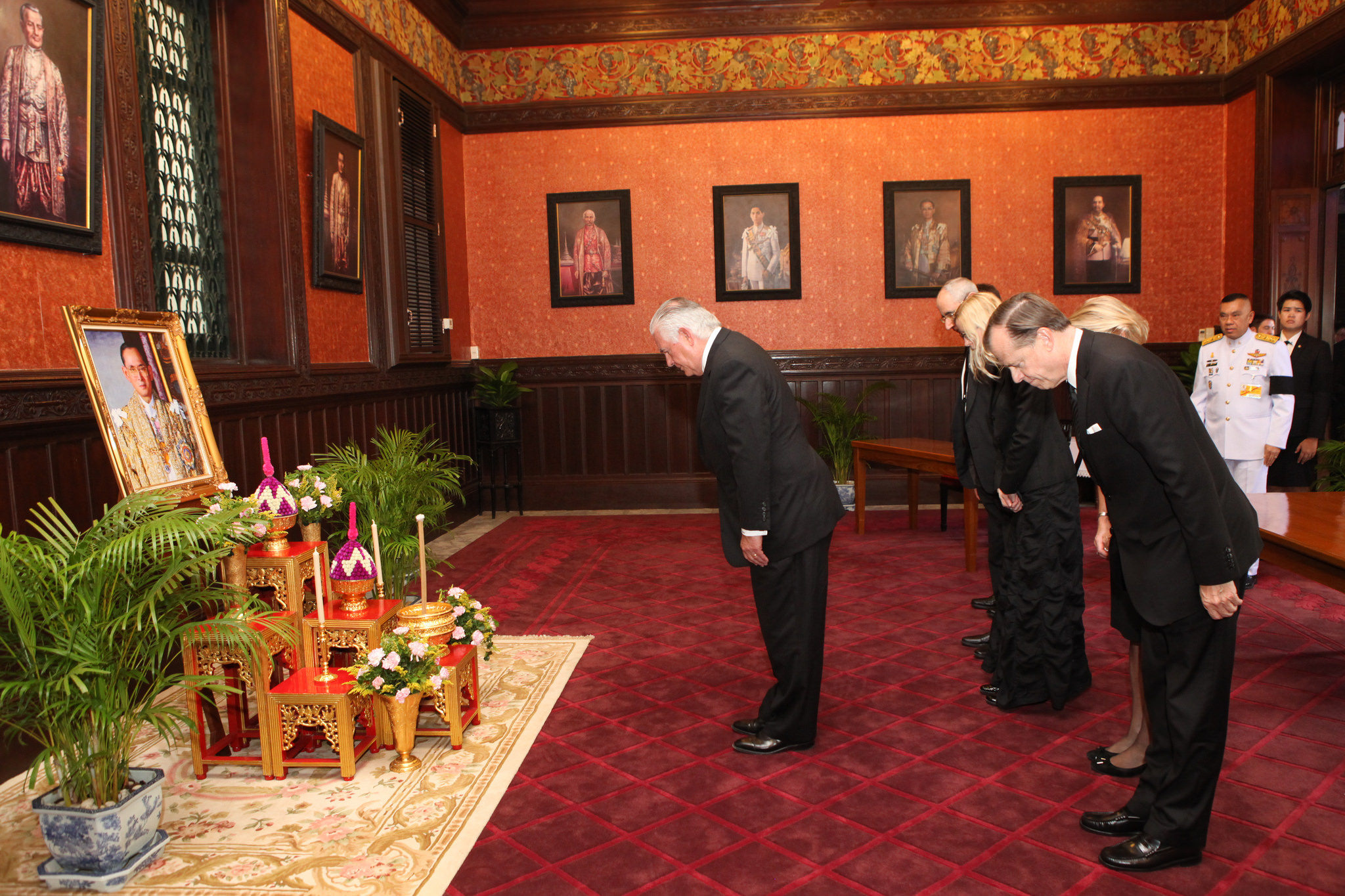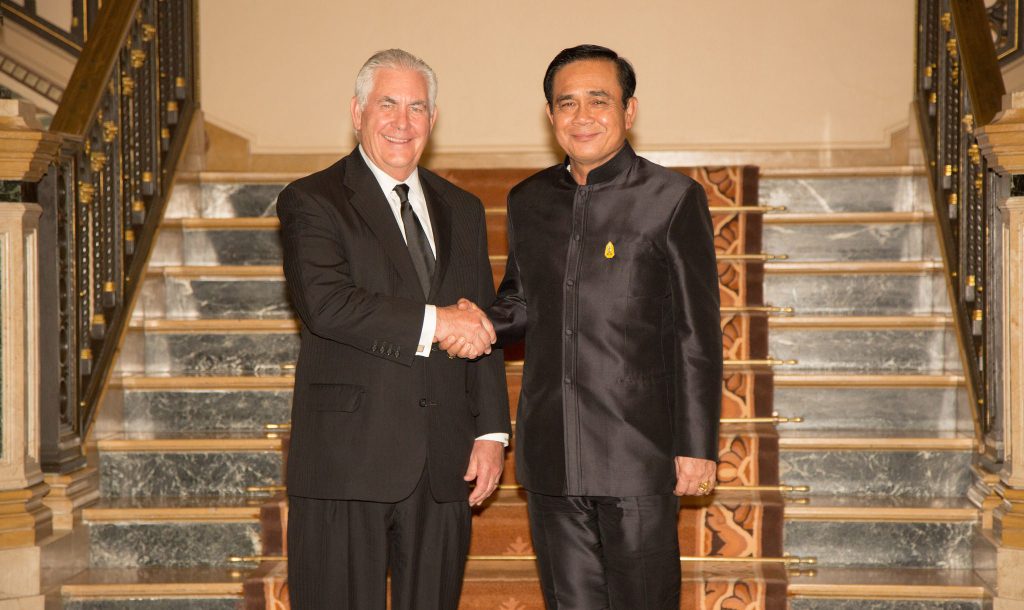On Tuesday, US Secretary of State Rex Tillerson visited Bangkok as part of a tour of the region. Top of the agenda was Thailand’s relationship with North Korea, but Tillerson also confirmed arrangements for Prime Minister Prayuth Chan-ocha to visit Washington in October and paid respects to the recently deceased King Bhumibol Adulyadej.
Conspicuously absent from the Secretary of State’s remarks, both to Thai officials and later to staff at the US Embassy, was any criticism about Thailand’s deteriorating human rights record. This apparently pragmatic approach marks a significant shift in Thai–US relations, which had cooled considerably after the military coup of May 2014, led by General Prayuth.
It is a rapprochement that permanently threatens Thailand’s already struggling democracy.
In Thailand, symbols matter. Throughout the Cold War, pronouncements of US support for dictatorship were vital in securing the dominance of the Royal Thai Army. As long as Thai generals could point to American friends guaranteeing economic development, they could align themselves (however loosely) with the principles of freedom and democracy that legitimised their role. For their part, US actors, by claiming to respect Thailand’s cultural traditions (primarily through support for the Thai monarchy) helped frame communism as a threat to the Thai ‘way of life’.
This consensus changed in the early 1990s when a popular movement emerged from within the urban middle class calling for reduced military power and greater accountability. In May 1992 military leaders ordered the suppression of pro-democracy protesters leading to scores of deaths. For many within Thailand, the heavily-censored local media meant that international outlets became the only trusted source of news. With Thailand’s leaders condemned by the international community, it was the protesters who now commanded the respect of global peers.
Thailand, it was clear, was out of step.
With the end of the Cold War, and communism no longer a threat, authoritarian regimes through Asia were falling or being forced to adapt. The emerging new order, led by the middle class, was characterised by a shift towards greater democratic accountability and underpinned by a shift toward neoliberal economics. It was at this point that King Bhumibol Adulyadej, in the fifth decade of his reign, stepped in, aligning his own destiny with the forces of change.
In an exquisitely dramatised exchange, broadcast across state media, His Majesty sternly encouraged then Prime Minister General Suchinda Kraprayoon to reconcile with enraged civilian leaders. The king, in a single stroke, positioned himself in line with global trends, at the same time securing the enduring affection of Thailand’s middle classes. This royal intervention also marked a historic breakpoint that was followed by economic deregulation and more democracy so that by the beginning of the new millennium, Thailand appeared to have taken its place within a world united around free market economics and liberal politics; what the political economist Francis Fukuyama had boldly described as ‘the end of history’. Portraying himself as a critical agent of change, King Bhumibol helped authenticate the moment as an intrinsically natural and necessary step for the Thai people. He also reaffirmed his status as a benevolent monarch who, by appearing to gift the next step toward democratisation, demonstrated his love and concern for the Thai people: the embodiment of Buddhist virtues that confirmed his divinity.
By 2005, however, the Thai establishment had grown weary of elections that repeatedly elected populist parties connected to Thaksin Shinawatra. In 2010, the army violently attacked Thaksin-supporting ‘Red Shirt’ protesters, many of whom had spent months away from rural homes to call for elections. Taking to the internet, the middle classes rallied to support the establishment view that force was necessary. They also joined a chorus of growing disdain for the international media, taking particular issue with what they felt was the uncritical reporting of Red demands for more democracy. Of all the networks, CNN was most notably earmarked for derision.
In late 2013, middle class groups were once again mobilised to topple a Thaksin linked government, finally provoking the May 2014 coup. Since then, Prayuth’s government and the royalists who support him have been relentless in attempts to extinguish both the influence of Thaksin and the political system that produced him. Many from the middle class have cheered them on.

Secretary of State Rex Tillerson pays his respects to the late Rama IX in Bangkok on 8 August. (Photo: US Department of State)
Today Thailand is the polar opposite of what King Bhumibol’s 1992 military-civilian mediation was supposed to foretell. Journalists are silenced; sharing a critical Facebook post can land someone in prison; and many who oppose military rule have been forced into exile.
The country also has a new King, Maha Vajiralongkorn, whose erratic behaviour and strongman persona has helped stabilise autocratic rule. Elections are penciled in for next year, but the new constitution does more to diminish the institutions and symbols of democracy than reinstate them.
Throughout this time, Barack Obama’s White House had made it clear that Thailand had veered off course. While US economic commitments to the Junta remained largely intact, the symbolic relationship and professions of friendship that secured it deteriorated rapidly, leaving Thailand out in the cold. Come mid-2016, the country failed to win a non-permanent seat on the United National Security Council, scoring a humiliating loss to Kazakhstan by a vote of 55–193.
The election of Donald Trump, however, has blurred if not obscured Thailand’s status as an outlier and threatens to normalise many of those indicators that mark its descent into autocracy. For years now, Thais opposed to Thaksin have rallied against CNN and its counterparts as unreliable, a stance parallel to the new American president’s daily denunciations of “fake news”. Having rejected mainstream international media, conservatives and pro-royalists have turned to a gaggle of Thai nationalists and alt-right American journalists to reaffirm their political positions. Thai hardliners rail against the conspiracy to topple monarchy in favour of a globalist corporate-led government ushered in by Thaksin and his shadowy backers. Trump’s reliance on the same marginal outlets, such as Infowars—hosted by alt-right radio host Alex Jones—combined with his disregard for an informed free press, not only resonates with key segments of the Thai elite; these global conspiracy theorists share much of the same world. At the same time, strong man politics appear all the rage and with two from which to choose, a King and a Prime Minister, Thailand would appear to be ahead of the game.
Secretary of State Tillerson has already indicated that the State Department is considering dropping “democracy” from its global mission. On Tuesday, he kept his word. His meeting with Prime Minister Prayuth and Foreign Minister Don Pramudwinai has served to de facto legitimate both the ruling Junta and the anti-democratic forces that support it. Having spent a decade seeking to extinguish Thaksin-linked electoral politics, Thailand’s once liberal elite now sits comfortably alongside the most powerful populist movements of the age. History, with its faux teleology proclaiming the inevitable progression toward liberal democracy—so critical to the American balancing act during the Cold War and as embodied so brilliantly by King Bhumibol—has reached its natural conclusion. A dead end.
……………
Dr Matthew Phillips is based in the Department of History & Welsh History at Aberystwyth University. His book, Thailand in the Cold War, looks at the role that Thai and American consumers played in securing the alliance.
Header image: Secretary of State Rex Tillerson meeting for talks with Prime Minister Prayuth Chan-Ocha in Bangkok on 8 August 2017, via the US State Department on Flickr.
 Facebook
Facebook  Twitter
Twitter  Soundcloud
Soundcloud  Youtube
Youtube  Rss
Rss 